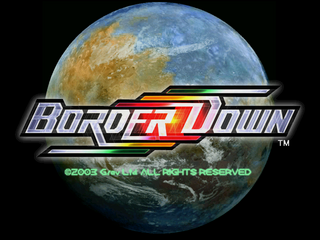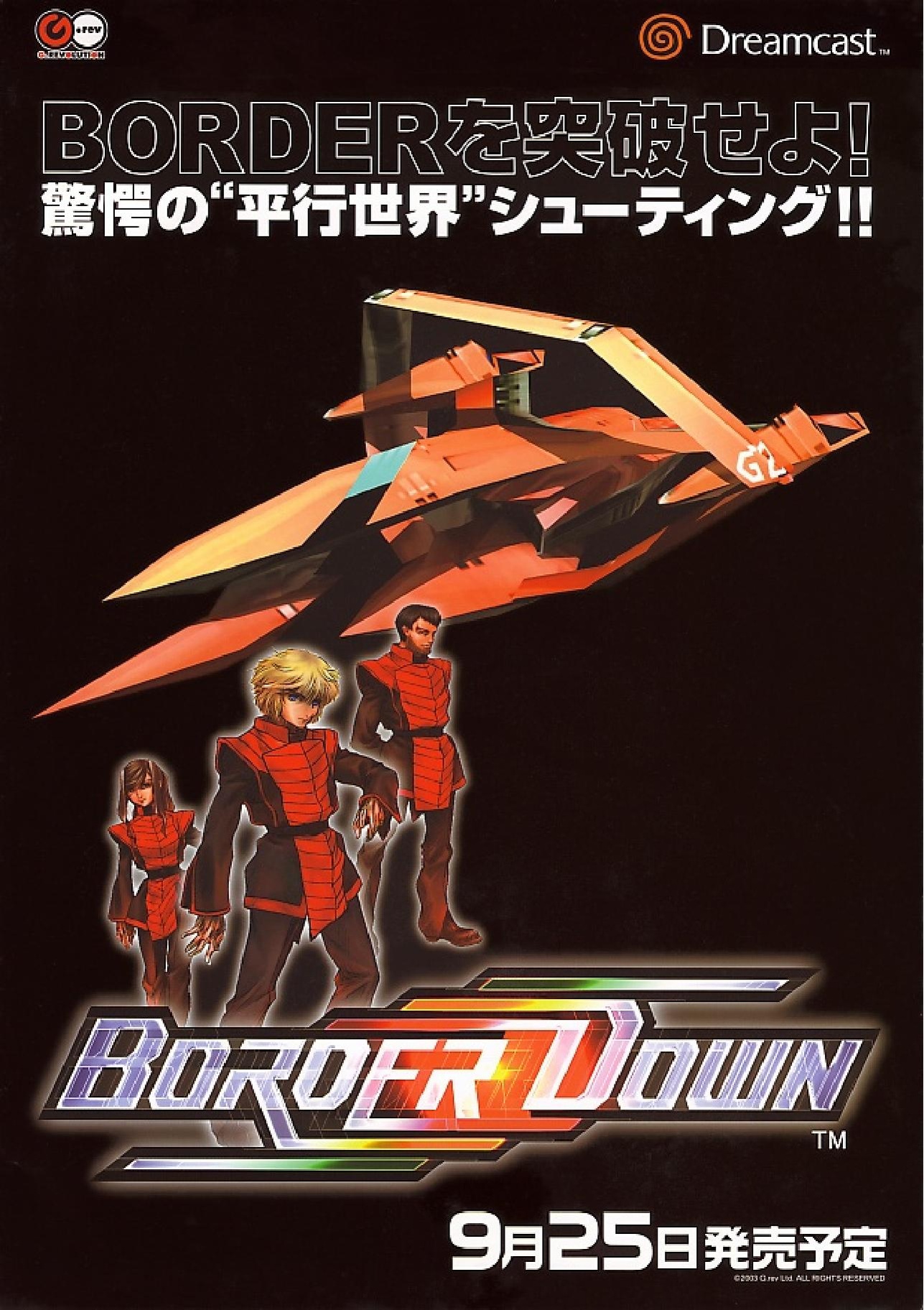Difference between revisions of "Border Down"
From Sega Retro
| Line 93: | Line 93: | ||
| disc= | | disc= | ||
| booklet=BorderDown DC JP booklet.pdf | | booklet=BorderDown DC JP booklet.pdf | ||
| + | | spinecard=BorderDown DC JP Spinecard LE.jpg | ||
| item1name=Audio CD | | item1name=Audio CD | ||
| item1=BorderDown DC JP audiodisc.png | | item1=BorderDown DC JP audiodisc.png | ||
Revision as of 12:41, 2 February 2023
| Border Down | |||||||||||||||||||
|---|---|---|---|---|---|---|---|---|---|---|---|---|---|---|---|---|---|---|---|
| System(s): Sega NAOMI GD-ROM, Sega Dreamcast | |||||||||||||||||||
| Publisher: Sega G.rev | |||||||||||||||||||
| Developer: G.rev | |||||||||||||||||||
| Peripherals supported: Dreamcast Arcade Stick, Jump Pack, Dreamcast VGA Box, Visual Memory Unit | |||||||||||||||||||
| Genre: Strategic Side-Scroll Shooting/Senryaku-kei Yoko Scroll Shooting (戦略系横スクロールシューティング)[1][2], Shooting[3] | |||||||||||||||||||
| Number of players: 1-2 | |||||||||||||||||||
|
This short article is in need of work. You can help Sega Retro by adding to it.
Border Down (ボーダーダウン) is a Sega NAOMI GD-ROM horizontal shoot-'em-up game developed by G.rev, released in 2003. It was ported to the Sega Dreamcast in the same year, with both a standard and Limited Edition released.
Border Down is a pseudo sequel to Taito's Metal Black. The games share certain enemy designs, story elements, gameplay mechanics and staff members.
The Dreamcast version features both original and remixed layouts for each stage. The remixed stages also offer a new soundtrack.
Contents
Gameplay
By default, holding ![]() shoots straight, tapping
shoots straight, tapping ![]() creates a homing shot,
creates a homing shot, ![]() changes movement speed and
changes movement speed and ![]() fires a concentrated laser beam. Unlike other games, Border Down has no lives system but rather uses it's own "border" system. Each stage has 3 layouts, called green, yellow and red border respectively. When losing a life, the player is forced to go "down" to the next border. Reversing this is only possible by clearing a score goal set for the respective stage.
Like most games released during this period, Border Down features detailed score mechanics and an external guide is recommended, although the game reveals some mechanics that are unlocked based on playtime.
fires a concentrated laser beam. Unlike other games, Border Down has no lives system but rather uses it's own "border" system. Each stage has 3 layouts, called green, yellow and red border respectively. When losing a life, the player is forced to go "down" to the next border. Reversing this is only possible by clearing a score goal set for the respective stage.
Like most games released during this period, Border Down features detailed score mechanics and an external guide is recommended, although the game reveals some mechanics that are unlocked based on playtime.
History
Release
The game received a reprint on January 17th, 2008.[4]
Production credits
- Director / Game Design: Hiroyuki Maruyama
- Main Program: Katsuyuki Fujita
- Stage / Player Program: Masakazu Takeda
- Enemy Program: Shunsuke Ono
- Main Graphic: R.Hideyuki.Katoh
- Music Compose / Sound Effect: Yasuhisa Watanabe - Yack. -
- Sub Graphic: Masami Kikuchi, Yokeno, Samejima, Ken Minefuji
- Character Design: Kadotukasa
- English Translation: Yuko Shirahashi
- Special Thanks: Kenji Sasaki (Sega Rosso), Jun Taniguchi (Sega Rosso), Takashi Hiraro (Sega Rosso), Kaoru Uno (Sega), Toshiaki Yuasa (Sega), Shinji Hosoe, Norihiro Furukawa
- Presented by: G.rev
Magazine articles
- Main article: Border Down/Magazine articles.
Promotional material
Physical scans
NAOMI version
Dreamcast version
| Sega Retro Average | |||||||||
|---|---|---|---|---|---|---|---|---|---|
|
| 60 | |
|---|---|
| Based on 1 review | |
Technical information
ROM dump status
| System | Hash | Size | Build Date | Source | Comments |
|---|
External links
References
- ↑ File:BorderDown DC JP Box Back.jpg
- ↑ 2.0 2.1 2.2 2.3 2.4 http://sega.jp/dc/030902/ (Wayback Machine: 2008-10-29 05:45)
- ↑ https://sega.jp/history/hard/dreamcast/software_l.html#tab02 (Wayback Machine: 2020-02-01 22:57)
- ↑ https://www.famitsu.com/game/news/1212848_1124.html (Wayback Machine: 2007-12-29 12:42)
- ↑ Edge, "December 2003" (UK; 2003-10-27), page 105
- Dreamcast Arcade Stick-compatible games
- Jump Pack-compatible games
- Dreamcast VGA Box-compatible games
- Visual Memory Unit-compatible games
- 1-2 player games
- All arcade games
- NAOMI GD-ROM games
- 2003 NAOMI GD-ROM games
- All 2003 games
- JP Dreamcast games
- All JP games
- Dreamcast games
- 2003 Dreamcast games
- Dreamcast simulation games
- All simulation games
- Dreamcast games with ADX audio
- All games
- Stubs
- Credits without reference
- No ROM dumps
- Missing ROM dumps
- Old technical information









